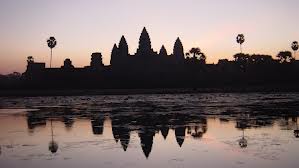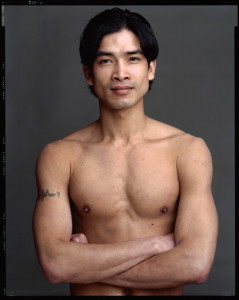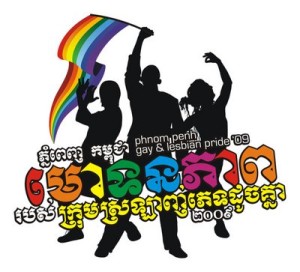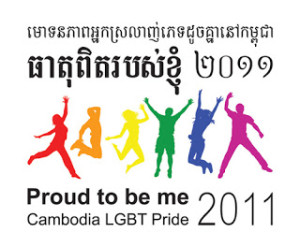Cambodia continues to evolve out of a dark and bloody past into a more organized and civilized society. By fits and starts an elected government is making efforts at control and organization but not all is peaceful and trustworthy. The former kind has died and the ruling government wobbles between dictatorship and democracy.
Meanwhile the hidden gay society quietly continues privately among natives and foreigners in a mix of cultures, ethnics, religions, political forces and NGO’s (non-governmental organizations). Caught in this matrix of conflict one western man learned his lesson the hard way. More recently, since 2008, a modest gay scene has developed in Phnom Penh and Siem Reap with bars and guesthouses.
Progress With Effort
There are more SUVs and new buildings in Phnom Penh than when I last visited; there’s peace on the streets and provinces, for now, allowing Cambodians to ferret out meager livings; a doctor makes $25 a month. Elections allow the current Premier Hun Sen (a former Khmer Rouge turned communist turned prime minister) to continue his autocratic rule. Opposition parties call the elections a fraud and mount protests but Hun Sen still holds tight rein. (photo right: Angkor Wat temple complex)
Cambodia is a country just managing to keep its head above water. Although no one is starving, the vast majority of people here live in impoverished conditions. The infrastructure is appalling and the government is ‘normally’ corrupt. If it were not for the presence of dozens of NGOs (non-governmental aid and advisory organizations), charity organizations and various UN agencies life UNESCO and UNICEF, the economy would implode.
Bringing medical, social, economic aid into the country, many of the NGOs perform crucial and beneficial services that help at the grass roots level. However, the price tag for some of these groups is their moral and religious beliefs which they urge on hapless docile people who are too deferential to resist the help–and fervor–of Christian proselytes.
NGOs and Hidden Agendas
The effect of some NGOs is highly suspect to one particular resident of Phnom Penh. Dr. Gavin Scott knows first hand that what is offered by an open hand can be accompanied by a hidden fist. Several years ago (as I reported here in my story) he was the target of a French Christian NGO’s false and corrupt charge of child abuse against him. Using false testimony the group pressured the local police into arresting Scott for sexually “molesting” two young men, who, it turned out, had been paid for their testimonies.
After spending 5 months in jail, his case was finally brought to court where it quickly and obviously fell apart. Instead of acquitting him of false charges, the court saved face and found him guilty but sentenced him to time already served. (The justice system is also feeble and fickle: the UN has set up a tribunal for bringing to justice the Khmer Rouge killers but Cambodia’s courts are so judicially unreliable that the tribunal has had little legal impact.)
Scott first came to Cambodia as a doctor for a one-year assignment about ten years ago, one of a small handful of physicians to serve in this torn country. Other docs have come and gone and for a while he was the only western-trained doctor in Phnom Penh. His specialty is infectious diseases and most of his patients are westerners although he sees Cambodians (at a lower cost). His resilience to the changing political winds over the years is matched by his defiance of homophobic NGOs which are only too willing to expose and persecute gay foreign workers regardless of their professional value and good works.
“This sort of thing happens all the time here to gay people,” said Scott recently over lunch at the enormous Cambodiana Hotel in Phmom Penh overlooking the Mekong River. “These groups come in here with their righteous morality and impose it on this Buddhist culture. I find that to be the real abuse. The law clearly states the age of consent in Cambodia is 15. But these Euro-American groups completely ignore this. They have this fixed idea that it should be 18 and it’s a perfect ruse to manipulate the police to persecute gay people living here. It is laughable and someone should take these NGOs to court for slander, defamation and violation of the Cambodian law.”
No Defenders for Gays
Scott was adamant and angry that these conservative organizations had not been held accountable for their homophobic and cynical action. “But of course no one wants the publicity. No one wants to be exposed for fear of losing their job. Not to mention that these NGOs have highly paid lawyers to defend and obscure any case against them. It’s so obvious they are wrong,” he insisted. (photo right: Cambodian dancer)
“What usually happened is that the police are tipped off by these NGOs and instead of protesting and fighting back, the victims pay up. The police are really more interested in taking a bribe than executing justice. They don’t care who’s right or wrong, they need the money. Blackmail is very effective against gay people here. And the judges are no better. They completely ignore the law and will prosecute anyone if there is a profit to be made. They wanted to do that to me. They did in fact, so I spent five bloody months in jail for not breaking the law here. It was only when the case was out in the open that they backed off and saved face by sentencing me to time served. It was a farce but for me a terrible farce.”
Today, Gavin operates pretty much as his own agent. His private practice and independent life style allow him maximum freedom without the encumbrances of an organization and authority-which is just as well since he poorly tolerates bureaucracy and its usual cumbersome policies. However, the many gay people work for the numerous aid organizations in Cambodia and it is from these sources that a loose gay community has formed. There are no formal groups, no gay ‘places’, no meetings and certainly no activism. Rather, like other repressed or impoverished environments, there is a virtual community knit together by word of mouth, informal association and now somewhat by the Internet.
One of the NGOs, a well-known British fund, does have an outreach project for Cambodian transvestites and transsexuals in Phnom Penh. Gavin described a recent party (he didn’t attend) given by a wealthy expat in the guise of an informal party at the offices of this NGO. The invitations sent out through the grape vine were printed with the time and place and identification. However, the soft background image on the invitation displayed a scantily-dressed bare-chested young man that suggested the sub-theme for the evening. The crowd was mixed, not unexpectedly as a cover for the get-together of those in the know. Not surprising, handsome native waiters and busboys attended to the food and drink.
It was about as gay as Phnom Penh gets. It was polite, polished, formal, closeted, masked and given an air of dignity by the apparent affiliation with the respected charity group. The gathering included staff members from the numerous embassies, professionals from many NGOs (offering health, political, economic, religious, agricultural or architectural services, to name a few). The UN has a strong presence with its UNESCO and UNICEF branches. The World Heritage Foundation and the Monuments Foundation are also in Cambodia restoring ancient ruins. World Vision is big, as is SOS, the medical organization under Dr Beat Riche.
Set Apart from Local Life
But all these ‘white’ organizations and their inevitable gay subsets are mostly insulated from the population in the street. They are set apart and above from the poverty and dust in which most Cambodians live. It’s very unlikely that any polished attendee of the ‘white party’ showed up with a Cambodian boyfriend on his arm. Indeed, a native would have felt very out of place and self-conscious that evening.
There are, to be sure, some well-to-do Cambodian gays and lesbians in the very thin upper class in Phnom Penh but being seen or suggested as such would be carefully avoided. Cambodia is, aside from being repressed and poor, a conservative culture in which the upper class especially feel their family honor is both paramount as well as fragile. The higher the class the more protective and closeted they are.
Uninvited and unwanted at such a party were the more common local guys who hang out on the streets with their motorbike/taxis, work in hotels or business offices, guard the king’s palace or guide tourists around the city or temples. One afternoon, after checking my e-mail as one of the many shops along the Tonle Sap River in downtown Phnom Penh, a smiling ‘moto’ guy asked me if I wanted a ride. I said no and he quickly asked if I wanted a pretty lady. I said, no I wanted a pretty boy. He laughed and said, “oh, I can find for you.”
Then I said, how about a lady-boy to which he laughed again and said “oh yes. I can find.” We both laughed since I was kidding but he was ready to find me what I wanted. Anything for a small profit. There is a playfulness among the working classes that is not uptight about sexuality, but it can hardly be called ‘gay’. For them it’s ekeing out a living. Two dollars is a lot of money. (photo right: waiter at upscale restaurant)
So today in ‘modern’ Phnom Penh there is some change–mostly for the privileged–but most is unchanged. Foreign eyes scan the scene for handsome swarthy natives willing to earn a few dollars in a few hours. But among the locals there is hardly an awareness of what a gay identity means other than quick furtive sex. It’s unthinkable that two Cambodian men or women could afford a home of their own and live as a couple. It’s beyond the common imagination that intimate gay feelings can form an alternative form of love.
With rare and impossible-to-find exceptions most Cambodians (including gay Cambodians) have little insight into gay sexuality or society or rights. Most young natives here know what gay is but think of it as something that foreigners like to do and as a way to make money off of them. Or else if they know about gay Cambodians it is usually in the form of transvestite prostitutes who work in beauty parlors. (See my 1997 story for further descriptions of these transvestites.)
Cambodia is most famous for its great monuments and temples in Angkor Wat. The silent stone-carved faces hold the history and pain of a heavily conquered nation. And within that silence are–past and present–the lives of gay Cambodians.
 LGBT Life Comes Alive at Last
LGBT Life Comes Alive at Last
Gay life is coming to the surface more recently in the past couple of years with gay bars and guesthouses opening in Phnom Penh and Siem Reap. The first LGBT Pride Parade was held in 2004 in Phnom Penh, it is now a yearly event. The late King Sihanouk who was highly respected in his country, showed support for gay marriage in 2004. Nevertheless, the monarch had no executive powers, and no marriage laws have been enacted. In October 2007, current strongman, Hun Sen, Prime Minister of Cambodia revealed that his adopted daughter is lesbian; unfortunately he disowned her. Since then, reports say he has softened his stance and now advocates tolerance for all citizens.
Because the culture is predominantly Buddhist, there is not the kind of aggressive reaction against gays as seen in Christian or Muslim cultures. Despite family pressure to marry and have children gays and lesbians are becoming more confident and expressive and less traditional. (photos right and left: posters for Phnom Penh Pride events)
To investigate Cambodia’s ‘arrival’ on the modern scene, in 2010 the New York Times printed a fine story which said, “in Siem Reap, a small town that gets about a million tourists a year for the nearby ruins at Angkor Wat, gay visitors and locals are carving out a little haven. In the last few years, a small flurry of gay-friendly bars, restaurants and hotels has opened up in the city’s center and beyond, with wink-wink names like the Golden Banana and Cockatoo.”
Online there are web sites like CamboGuide, which is devoted to the gay community. Other sites like Utopia (utopia-asia.com) and Sticky Rice (stickyrice.ws), which appeal to gay people throughout Southeast Asia, have also raised the city’s profile.
By Richard Ammon
GlobalGayz.com
Update June 2012
Also see:
Utopia website
Gay Cambodia News & Reports
Cambodia Photo Galleries
Read the full New York Times story.
















